Sustainable and Responsible Tourism Management in Menorca Report
VerifiedAdded on 2023/01/11
|16
|5597
|21
Report
AI Summary
This report, prepared for the Association of Ecotourism in Spain, examines sustainable and responsible tourism management. It explores the evolution of the concept, the roles of global organizations like UNWTO and WTTC, and the principles of tourism development and planning. The report investigates the impacts of tourism activities from economic, social, cultural, and environmental perspectives, using Menorca as a case study. It evaluates how sustainability is implemented by specific tourism businesses and destinations, considering stakeholder requirements and the importance of community participation. The report emphasizes the need for strategic planning, resource management, and stakeholder engagement to minimize adverse impacts and promote sustainable tourism practices. The document provides a comprehensive analysis of the subject matter.
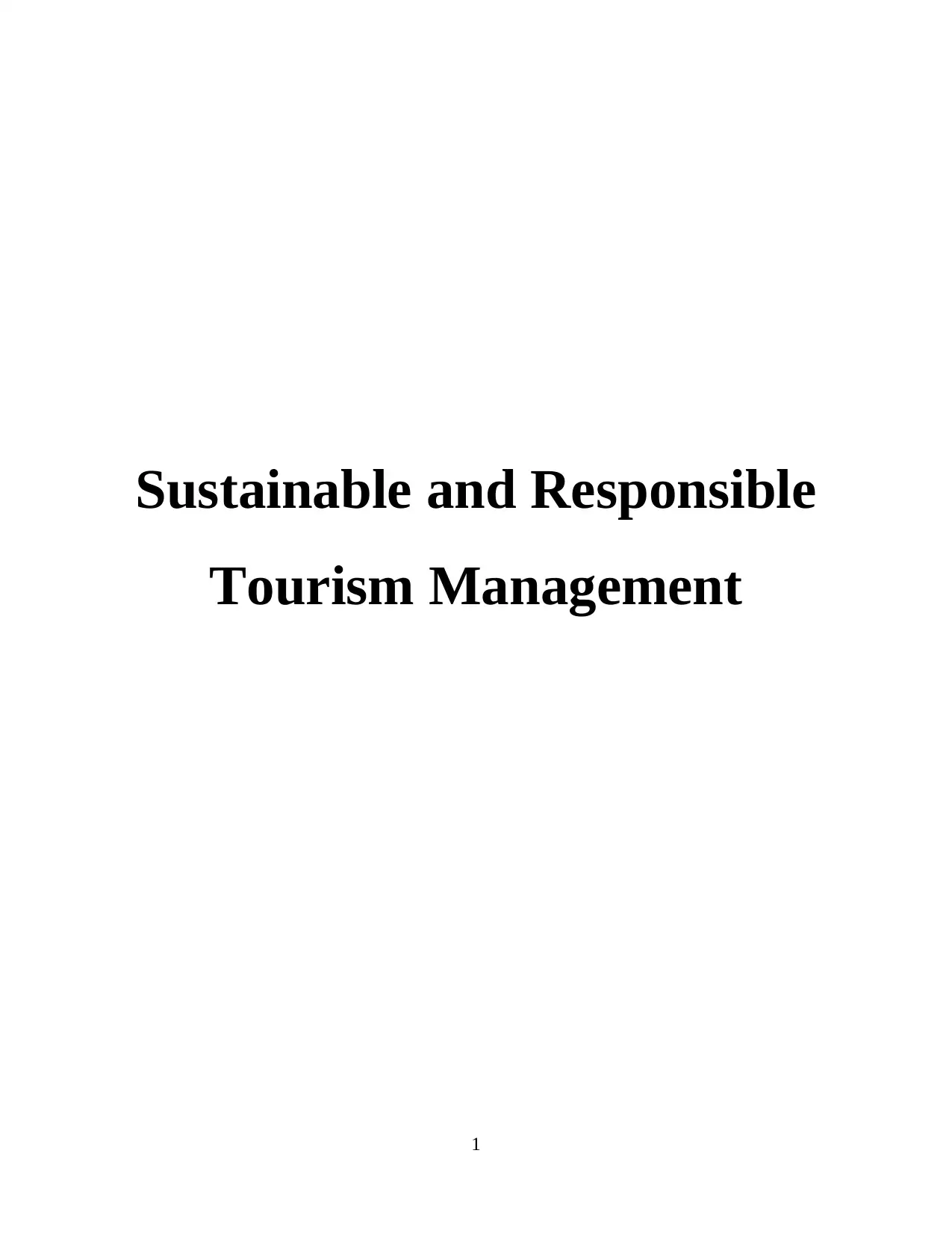
Sustainable and Responsible
Tourism Management
1
Tourism Management
1
Paraphrase This Document
Need a fresh take? Get an instant paraphrase of this document with our AI Paraphraser
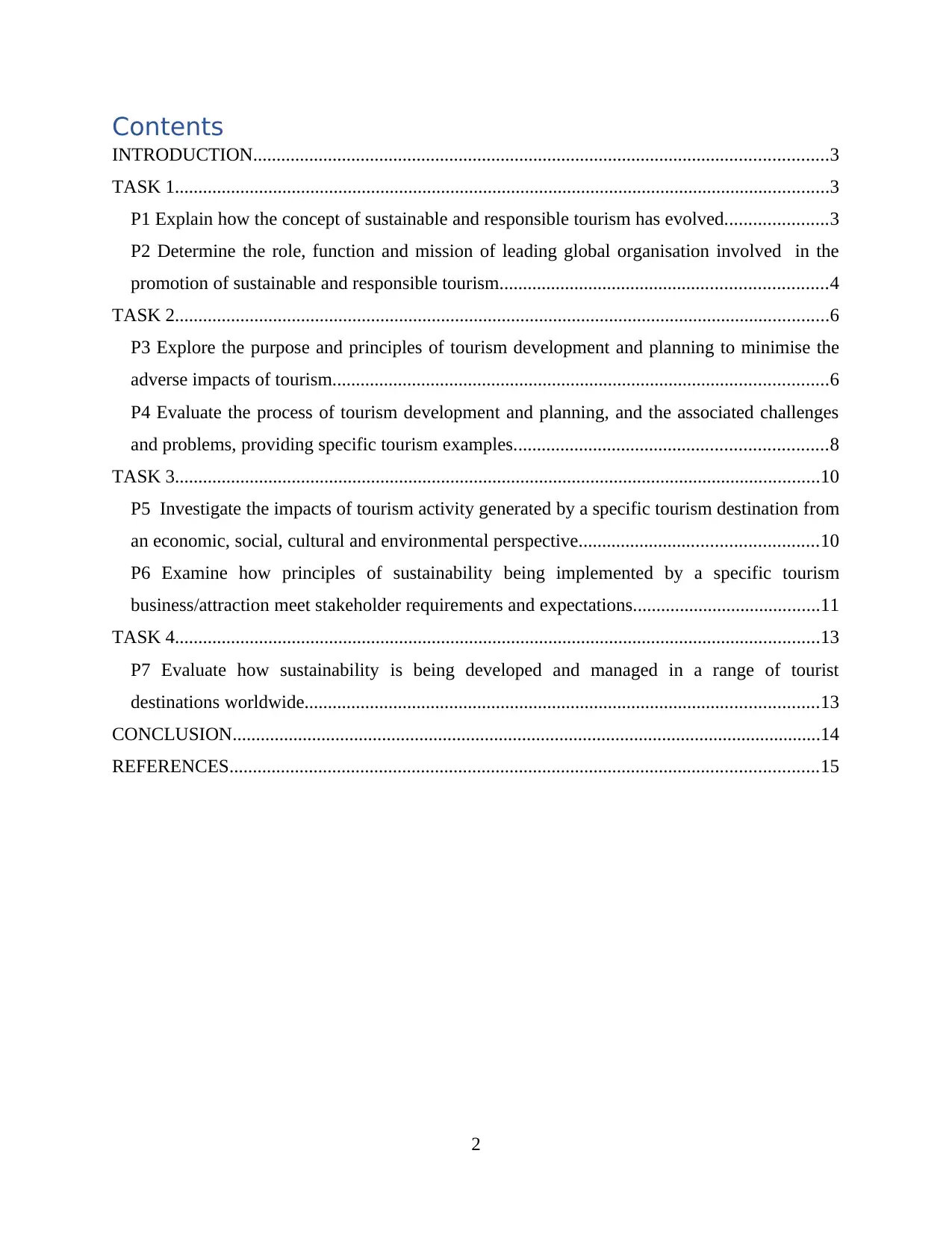
Contents
INTRODUCTION...........................................................................................................................3
TASK 1............................................................................................................................................3
P1 Explain how the concept of sustainable and responsible tourism has evolved......................3
P2 Determine the role, function and mission of leading global organisation involved in the
promotion of sustainable and responsible tourism......................................................................4
TASK 2............................................................................................................................................6
P3 Explore the purpose and principles of tourism development and planning to minimise the
adverse impacts of tourism..........................................................................................................6
P4 Evaluate the process of tourism development and planning, and the associated challenges
and problems, providing specific tourism examples...................................................................8
TASK 3..........................................................................................................................................10
P5 Investigate the impacts of tourism activity generated by a specific tourism destination from
an economic, social, cultural and environmental perspective...................................................10
P6 Examine how principles of sustainability being implemented by a specific tourism
business/attraction meet stakeholder requirements and expectations........................................11
TASK 4..........................................................................................................................................13
P7 Evaluate how sustainability is being developed and managed in a range of tourist
destinations worldwide..............................................................................................................13
CONCLUSION..............................................................................................................................14
REFERENCES..............................................................................................................................15
2
INTRODUCTION...........................................................................................................................3
TASK 1............................................................................................................................................3
P1 Explain how the concept of sustainable and responsible tourism has evolved......................3
P2 Determine the role, function and mission of leading global organisation involved in the
promotion of sustainable and responsible tourism......................................................................4
TASK 2............................................................................................................................................6
P3 Explore the purpose and principles of tourism development and planning to minimise the
adverse impacts of tourism..........................................................................................................6
P4 Evaluate the process of tourism development and planning, and the associated challenges
and problems, providing specific tourism examples...................................................................8
TASK 3..........................................................................................................................................10
P5 Investigate the impacts of tourism activity generated by a specific tourism destination from
an economic, social, cultural and environmental perspective...................................................10
P6 Examine how principles of sustainability being implemented by a specific tourism
business/attraction meet stakeholder requirements and expectations........................................11
TASK 4..........................................................................................................................................13
P7 Evaluate how sustainability is being developed and managed in a range of tourist
destinations worldwide..............................................................................................................13
CONCLUSION..............................................................................................................................14
REFERENCES..............................................................................................................................15
2
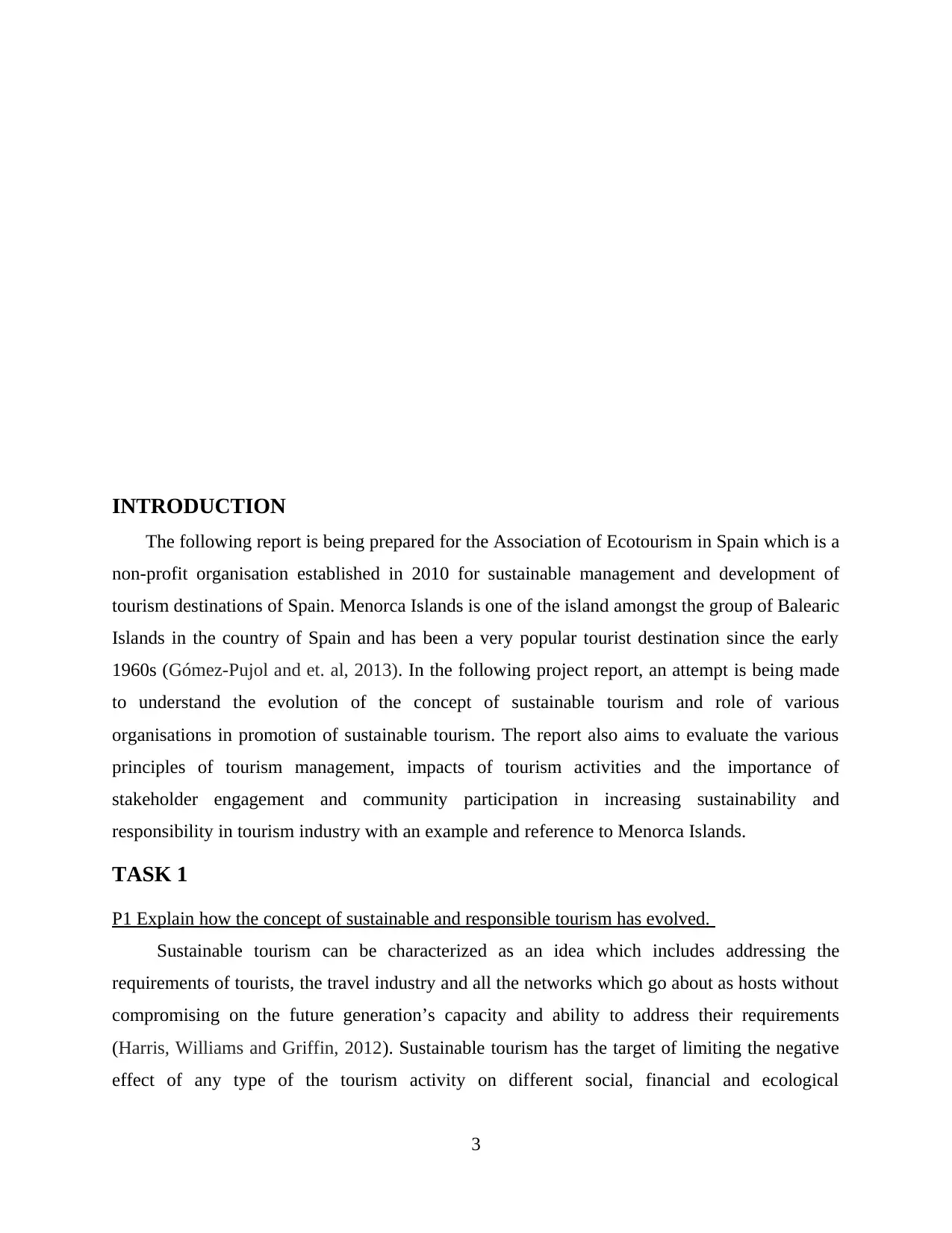
INTRODUCTION
The following report is being prepared for the Association of Ecotourism in Spain which is a
non-profit organisation established in 2010 for sustainable management and development of
tourism destinations of Spain. Menorca Islands is one of the island amongst the group of Balearic
Islands in the country of Spain and has been a very popular tourist destination since the early
1960s (Gómez-Pujol and et. al, 2013). In the following project report, an attempt is being made
to understand the evolution of the concept of sustainable tourism and role of various
organisations in promotion of sustainable tourism. The report also aims to evaluate the various
principles of tourism management, impacts of tourism activities and the importance of
stakeholder engagement and community participation in increasing sustainability and
responsibility in tourism industry with an example and reference to Menorca Islands.
TASK 1
P1 Explain how the concept of sustainable and responsible tourism has evolved.
Sustainable tourism can be characterized as an idea which includes addressing the
requirements of tourists, the travel industry and all the networks which go about as hosts without
compromising on the future generation’s capacity and ability to address their requirements
(Harris, Williams and Griffin, 2012). Sustainable tourism has the target of limiting the negative
effect of any type of the tourism activity on different social, financial and ecological
3
The following report is being prepared for the Association of Ecotourism in Spain which is a
non-profit organisation established in 2010 for sustainable management and development of
tourism destinations of Spain. Menorca Islands is one of the island amongst the group of Balearic
Islands in the country of Spain and has been a very popular tourist destination since the early
1960s (Gómez-Pujol and et. al, 2013). In the following project report, an attempt is being made
to understand the evolution of the concept of sustainable tourism and role of various
organisations in promotion of sustainable tourism. The report also aims to evaluate the various
principles of tourism management, impacts of tourism activities and the importance of
stakeholder engagement and community participation in increasing sustainability and
responsibility in tourism industry with an example and reference to Menorca Islands.
TASK 1
P1 Explain how the concept of sustainable and responsible tourism has evolved.
Sustainable tourism can be characterized as an idea which includes addressing the
requirements of tourists, the travel industry and all the networks which go about as hosts without
compromising on the future generation’s capacity and ability to address their requirements
(Harris, Williams and Griffin, 2012). Sustainable tourism has the target of limiting the negative
effect of any type of the tourism activity on different social, financial and ecological
3
⊘ This is a preview!⊘
Do you want full access?
Subscribe today to unlock all pages.

Trusted by 1+ million students worldwide
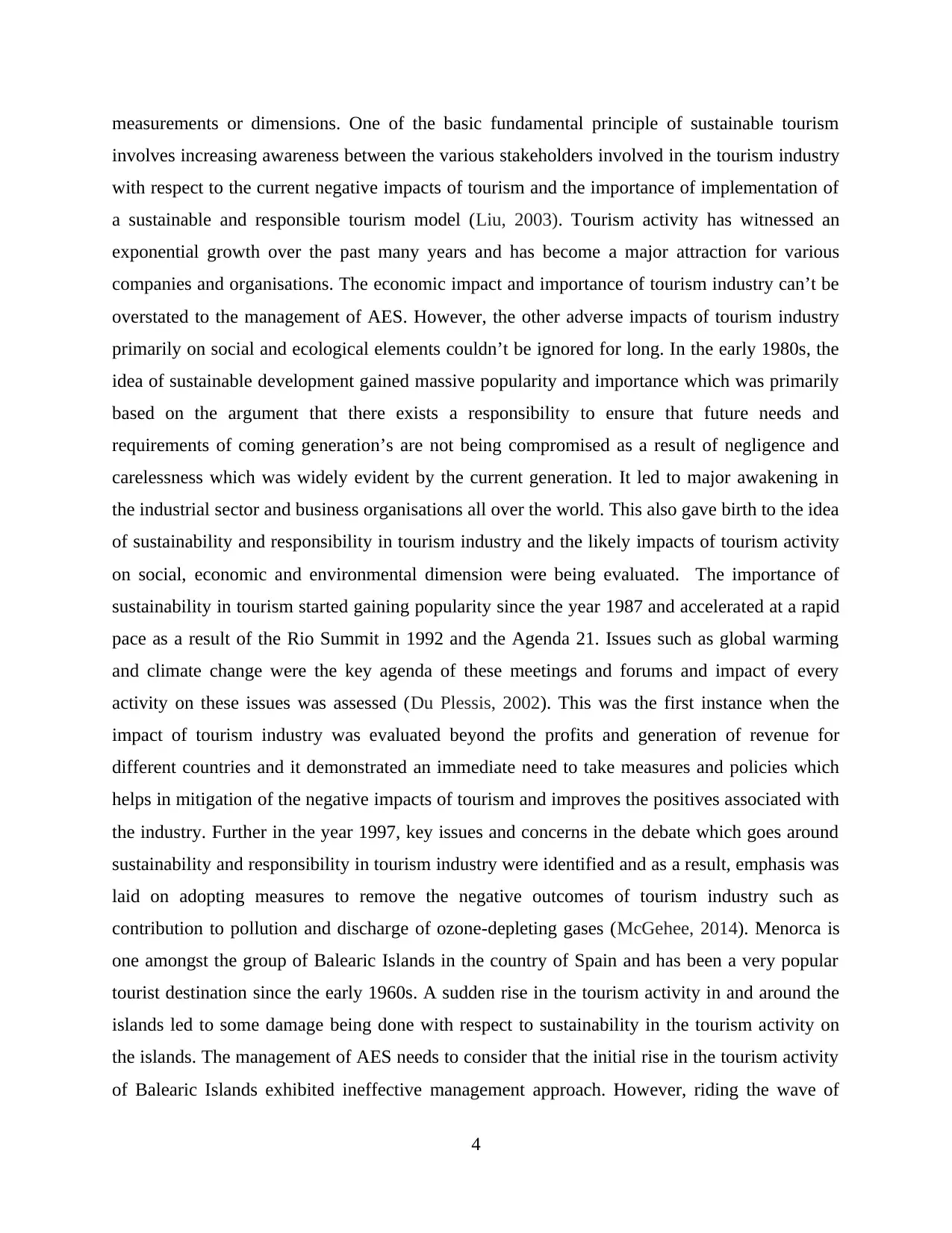
measurements or dimensions. One of the basic fundamental principle of sustainable tourism
involves increasing awareness between the various stakeholders involved in the tourism industry
with respect to the current negative impacts of tourism and the importance of implementation of
a sustainable and responsible tourism model (Liu, 2003). Tourism activity has witnessed an
exponential growth over the past many years and has become a major attraction for various
companies and organisations. The economic impact and importance of tourism industry can’t be
overstated to the management of AES. However, the other adverse impacts of tourism industry
primarily on social and ecological elements couldn’t be ignored for long. In the early 1980s, the
idea of sustainable development gained massive popularity and importance which was primarily
based on the argument that there exists a responsibility to ensure that future needs and
requirements of coming generation’s are not being compromised as a result of negligence and
carelessness which was widely evident by the current generation. It led to major awakening in
the industrial sector and business organisations all over the world. This also gave birth to the idea
of sustainability and responsibility in tourism industry and the likely impacts of tourism activity
on social, economic and environmental dimension were being evaluated. The importance of
sustainability in tourism started gaining popularity since the year 1987 and accelerated at a rapid
pace as a result of the Rio Summit in 1992 and the Agenda 21. Issues such as global warming
and climate change were the key agenda of these meetings and forums and impact of every
activity on these issues was assessed (Du Plessis, 2002). This was the first instance when the
impact of tourism industry was evaluated beyond the profits and generation of revenue for
different countries and it demonstrated an immediate need to take measures and policies which
helps in mitigation of the negative impacts of tourism and improves the positives associated with
the industry. Further in the year 1997, key issues and concerns in the debate which goes around
sustainability and responsibility in tourism industry were identified and as a result, emphasis was
laid on adopting measures to remove the negative outcomes of tourism industry such as
contribution to pollution and discharge of ozone-depleting gases (McGehee, 2014). Menorca is
one amongst the group of Balearic Islands in the country of Spain and has been a very popular
tourist destination since the early 1960s. A sudden rise in the tourism activity in and around the
islands led to some damage being done with respect to sustainability in the tourism activity on
the islands. The management of AES needs to consider that the initial rise in the tourism activity
of Balearic Islands exhibited ineffective management approach. However, riding the wave of
4
involves increasing awareness between the various stakeholders involved in the tourism industry
with respect to the current negative impacts of tourism and the importance of implementation of
a sustainable and responsible tourism model (Liu, 2003). Tourism activity has witnessed an
exponential growth over the past many years and has become a major attraction for various
companies and organisations. The economic impact and importance of tourism industry can’t be
overstated to the management of AES. However, the other adverse impacts of tourism industry
primarily on social and ecological elements couldn’t be ignored for long. In the early 1980s, the
idea of sustainable development gained massive popularity and importance which was primarily
based on the argument that there exists a responsibility to ensure that future needs and
requirements of coming generation’s are not being compromised as a result of negligence and
carelessness which was widely evident by the current generation. It led to major awakening in
the industrial sector and business organisations all over the world. This also gave birth to the idea
of sustainability and responsibility in tourism industry and the likely impacts of tourism activity
on social, economic and environmental dimension were being evaluated. The importance of
sustainability in tourism started gaining popularity since the year 1987 and accelerated at a rapid
pace as a result of the Rio Summit in 1992 and the Agenda 21. Issues such as global warming
and climate change were the key agenda of these meetings and forums and impact of every
activity on these issues was assessed (Du Plessis, 2002). This was the first instance when the
impact of tourism industry was evaluated beyond the profits and generation of revenue for
different countries and it demonstrated an immediate need to take measures and policies which
helps in mitigation of the negative impacts of tourism and improves the positives associated with
the industry. Further in the year 1997, key issues and concerns in the debate which goes around
sustainability and responsibility in tourism industry were identified and as a result, emphasis was
laid on adopting measures to remove the negative outcomes of tourism industry such as
contribution to pollution and discharge of ozone-depleting gases (McGehee, 2014). Menorca is
one amongst the group of Balearic Islands in the country of Spain and has been a very popular
tourist destination since the early 1960s. A sudden rise in the tourism activity in and around the
islands led to some damage being done with respect to sustainability in the tourism activity on
the islands. The management of AES needs to consider that the initial rise in the tourism activity
of Balearic Islands exhibited ineffective management approach. However, riding the wave of
4
Paraphrase This Document
Need a fresh take? Get an instant paraphrase of this document with our AI Paraphraser
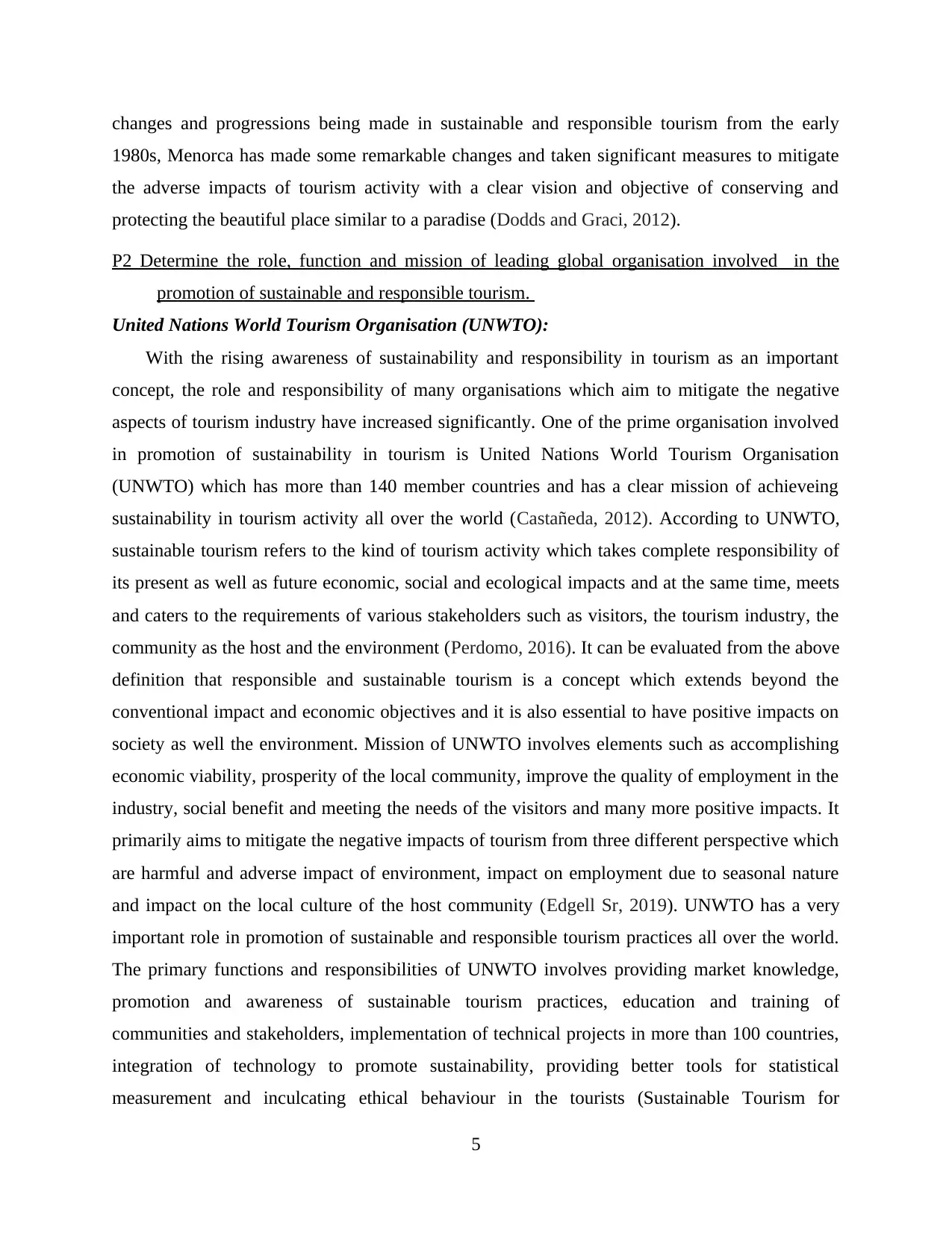
changes and progressions being made in sustainable and responsible tourism from the early
1980s, Menorca has made some remarkable changes and taken significant measures to mitigate
the adverse impacts of tourism activity with a clear vision and objective of conserving and
protecting the beautiful place similar to a paradise (Dodds and Graci, 2012).
P2 Determine the role, function and mission of leading global organisation involved in the
promotion of sustainable and responsible tourism.
United Nations World Tourism Organisation (UNWTO):
With the rising awareness of sustainability and responsibility in tourism as an important
concept, the role and responsibility of many organisations which aim to mitigate the negative
aspects of tourism industry have increased significantly. One of the prime organisation involved
in promotion of sustainability in tourism is United Nations World Tourism Organisation
(UNWTO) which has more than 140 member countries and has a clear mission of achieveing
sustainability in tourism activity all over the world (Castañeda, 2012). According to UNWTO,
sustainable tourism refers to the kind of tourism activity which takes complete responsibility of
its present as well as future economic, social and ecological impacts and at the same time, meets
and caters to the requirements of various stakeholders such as visitors, the tourism industry, the
community as the host and the environment (Perdomo, 2016). It can be evaluated from the above
definition that responsible and sustainable tourism is a concept which extends beyond the
conventional impact and economic objectives and it is also essential to have positive impacts on
society as well the environment. Mission of UNWTO involves elements such as accomplishing
economic viability, prosperity of the local community, improve the quality of employment in the
industry, social benefit and meeting the needs of the visitors and many more positive impacts. It
primarily aims to mitigate the negative impacts of tourism from three different perspective which
are harmful and adverse impact of environment, impact on employment due to seasonal nature
and impact on the local culture of the host community (Edgell Sr, 2019). UNWTO has a very
important role in promotion of sustainable and responsible tourism practices all over the world.
The primary functions and responsibilities of UNWTO involves providing market knowledge,
promotion and awareness of sustainable tourism practices, education and training of
communities and stakeholders, implementation of technical projects in more than 100 countries,
integration of technology to promote sustainability, providing better tools for statistical
measurement and inculcating ethical behaviour in the tourists (Sustainable Tourism for
5
1980s, Menorca has made some remarkable changes and taken significant measures to mitigate
the adverse impacts of tourism activity with a clear vision and objective of conserving and
protecting the beautiful place similar to a paradise (Dodds and Graci, 2012).
P2 Determine the role, function and mission of leading global organisation involved in the
promotion of sustainable and responsible tourism.
United Nations World Tourism Organisation (UNWTO):
With the rising awareness of sustainability and responsibility in tourism as an important
concept, the role and responsibility of many organisations which aim to mitigate the negative
aspects of tourism industry have increased significantly. One of the prime organisation involved
in promotion of sustainability in tourism is United Nations World Tourism Organisation
(UNWTO) which has more than 140 member countries and has a clear mission of achieveing
sustainability in tourism activity all over the world (Castañeda, 2012). According to UNWTO,
sustainable tourism refers to the kind of tourism activity which takes complete responsibility of
its present as well as future economic, social and ecological impacts and at the same time, meets
and caters to the requirements of various stakeholders such as visitors, the tourism industry, the
community as the host and the environment (Perdomo, 2016). It can be evaluated from the above
definition that responsible and sustainable tourism is a concept which extends beyond the
conventional impact and economic objectives and it is also essential to have positive impacts on
society as well the environment. Mission of UNWTO involves elements such as accomplishing
economic viability, prosperity of the local community, improve the quality of employment in the
industry, social benefit and meeting the needs of the visitors and many more positive impacts. It
primarily aims to mitigate the negative impacts of tourism from three different perspective which
are harmful and adverse impact of environment, impact on employment due to seasonal nature
and impact on the local culture of the host community (Edgell Sr, 2019). UNWTO has a very
important role in promotion of sustainable and responsible tourism practices all over the world.
The primary functions and responsibilities of UNWTO involves providing market knowledge,
promotion and awareness of sustainable tourism practices, education and training of
communities and stakeholders, implementation of technical projects in more than 100 countries,
integration of technology to promote sustainability, providing better tools for statistical
measurement and inculcating ethical behaviour in the tourists (Sustainable Tourism for
5
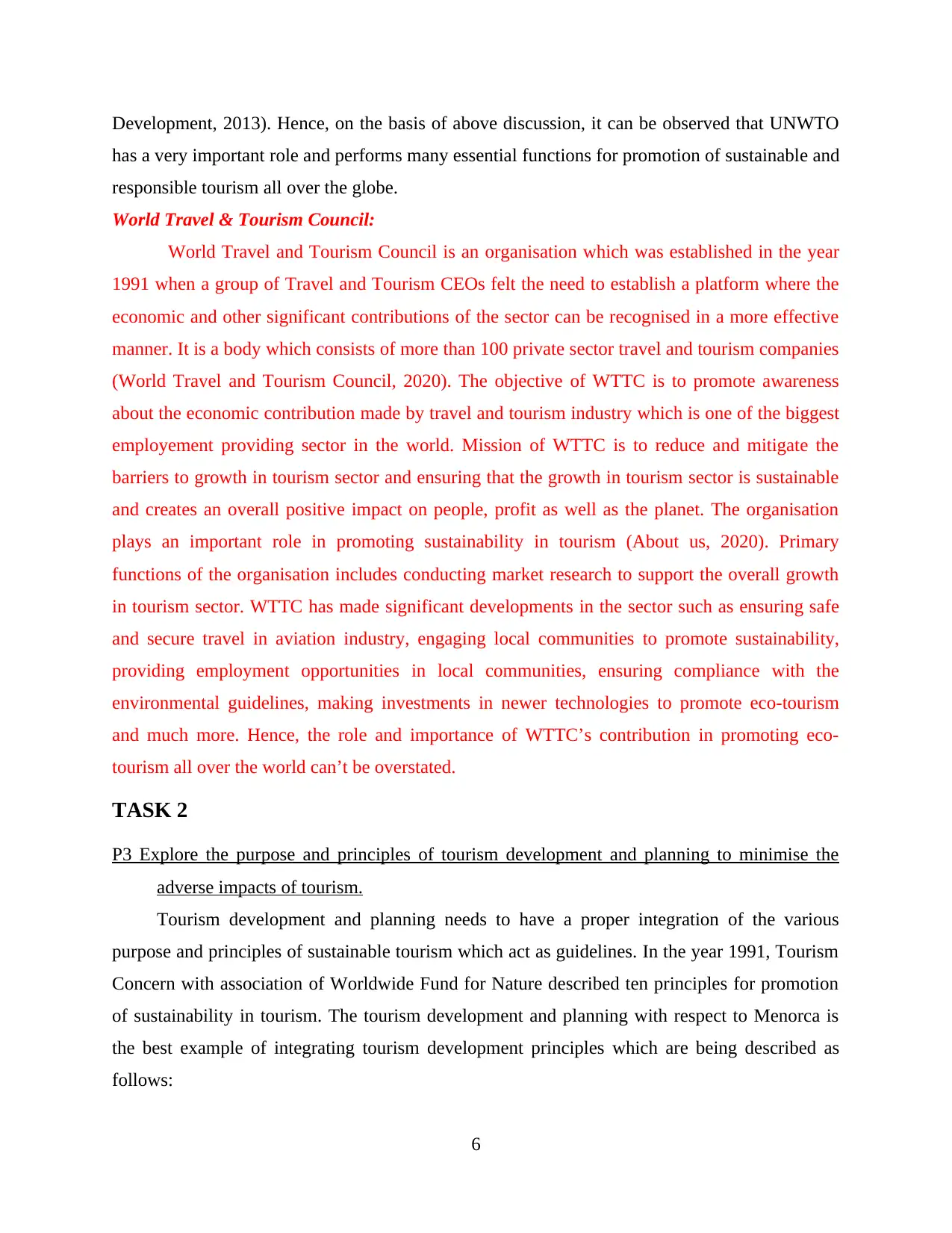
Development, 2013). Hence, on the basis of above discussion, it can be observed that UNWTO
has a very important role and performs many essential functions for promotion of sustainable and
responsible tourism all over the globe.
World Travel & Tourism Council:
World Travel and Tourism Council is an organisation which was established in the year
1991 when a group of Travel and Tourism CEOs felt the need to establish a platform where the
economic and other significant contributions of the sector can be recognised in a more effective
manner. It is a body which consists of more than 100 private sector travel and tourism companies
(World Travel and Tourism Council, 2020). The objective of WTTC is to promote awareness
about the economic contribution made by travel and tourism industry which is one of the biggest
employement providing sector in the world. Mission of WTTC is to reduce and mitigate the
barriers to growth in tourism sector and ensuring that the growth in tourism sector is sustainable
and creates an overall positive impact on people, profit as well as the planet. The organisation
plays an important role in promoting sustainability in tourism (About us, 2020). Primary
functions of the organisation includes conducting market research to support the overall growth
in tourism sector. WTTC has made significant developments in the sector such as ensuring safe
and secure travel in aviation industry, engaging local communities to promote sustainability,
providing employment opportunities in local communities, ensuring compliance with the
environmental guidelines, making investments in newer technologies to promote eco-tourism
and much more. Hence, the role and importance of WTTC’s contribution in promoting eco-
tourism all over the world can’t be overstated.
TASK 2
P3 Explore the purpose and principles of tourism development and planning to minimise the
adverse impacts of tourism.
Tourism development and planning needs to have a proper integration of the various
purpose and principles of sustainable tourism which act as guidelines. In the year 1991, Tourism
Concern with association of Worldwide Fund for Nature described ten principles for promotion
of sustainability in tourism. The tourism development and planning with respect to Menorca is
the best example of integrating tourism development principles which are being described as
follows:
6
has a very important role and performs many essential functions for promotion of sustainable and
responsible tourism all over the globe.
World Travel & Tourism Council:
World Travel and Tourism Council is an organisation which was established in the year
1991 when a group of Travel and Tourism CEOs felt the need to establish a platform where the
economic and other significant contributions of the sector can be recognised in a more effective
manner. It is a body which consists of more than 100 private sector travel and tourism companies
(World Travel and Tourism Council, 2020). The objective of WTTC is to promote awareness
about the economic contribution made by travel and tourism industry which is one of the biggest
employement providing sector in the world. Mission of WTTC is to reduce and mitigate the
barriers to growth in tourism sector and ensuring that the growth in tourism sector is sustainable
and creates an overall positive impact on people, profit as well as the planet. The organisation
plays an important role in promoting sustainability in tourism (About us, 2020). Primary
functions of the organisation includes conducting market research to support the overall growth
in tourism sector. WTTC has made significant developments in the sector such as ensuring safe
and secure travel in aviation industry, engaging local communities to promote sustainability,
providing employment opportunities in local communities, ensuring compliance with the
environmental guidelines, making investments in newer technologies to promote eco-tourism
and much more. Hence, the role and importance of WTTC’s contribution in promoting eco-
tourism all over the world can’t be overstated.
TASK 2
P3 Explore the purpose and principles of tourism development and planning to minimise the
adverse impacts of tourism.
Tourism development and planning needs to have a proper integration of the various
purpose and principles of sustainable tourism which act as guidelines. In the year 1991, Tourism
Concern with association of Worldwide Fund for Nature described ten principles for promotion
of sustainability in tourism. The tourism development and planning with respect to Menorca is
the best example of integrating tourism development principles which are being described as
follows:
6
⊘ This is a preview!⊘
Do you want full access?
Subscribe today to unlock all pages.

Trusted by 1+ million students worldwide
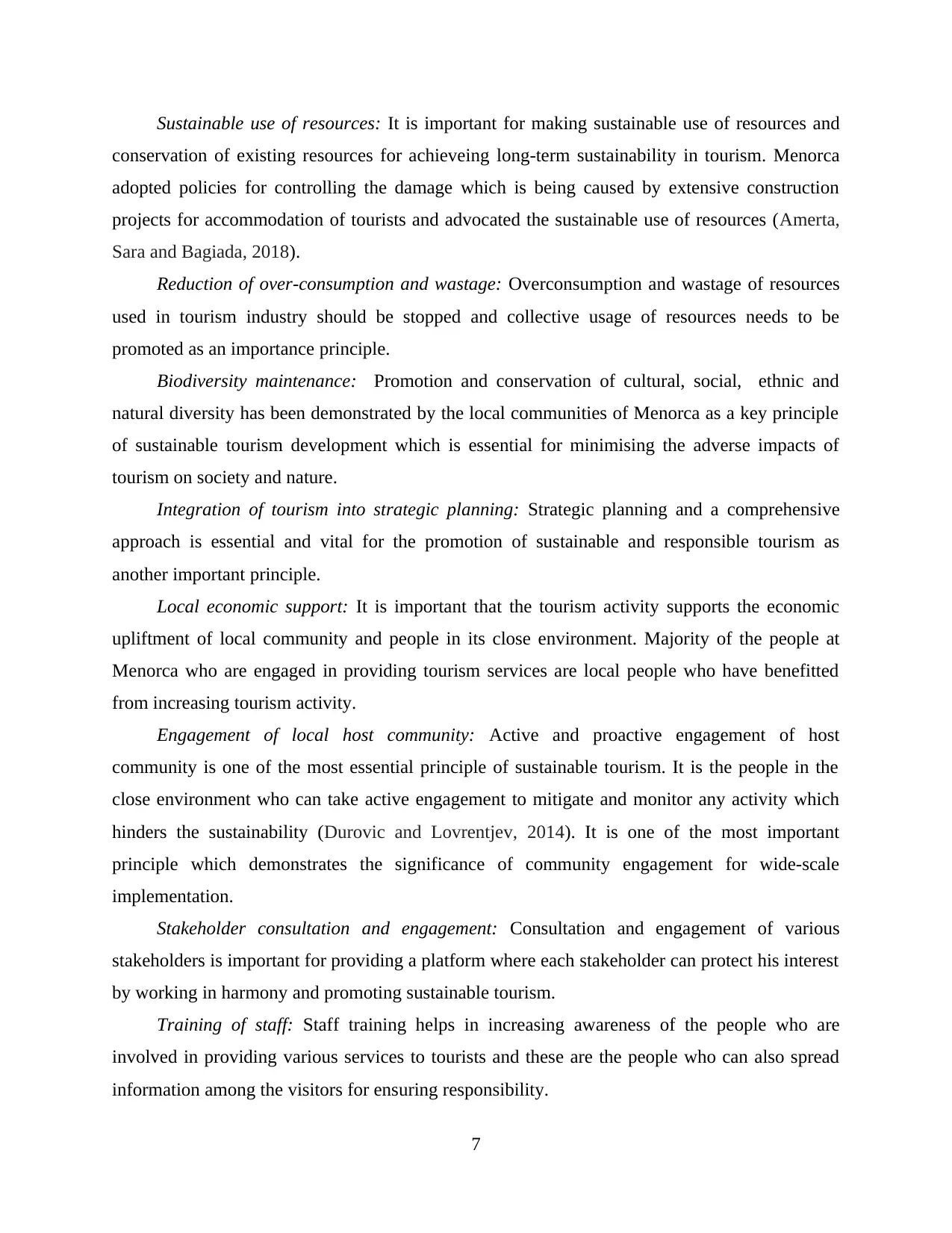
Sustainable use of resources: It is important for making sustainable use of resources and
conservation of existing resources for achieveing long-term sustainability in tourism. Menorca
adopted policies for controlling the damage which is being caused by extensive construction
projects for accommodation of tourists and advocated the sustainable use of resources (Amerta,
Sara and Bagiada, 2018).
Reduction of over-consumption and wastage: Overconsumption and wastage of resources
used in tourism industry should be stopped and collective usage of resources needs to be
promoted as an importance principle.
Biodiversity maintenance: Promotion and conservation of cultural, social, ethnic and
natural diversity has been demonstrated by the local communities of Menorca as a key principle
of sustainable tourism development which is essential for minimising the adverse impacts of
tourism on society and nature.
Integration of tourism into strategic planning: Strategic planning and a comprehensive
approach is essential and vital for the promotion of sustainable and responsible tourism as
another important principle.
Local economic support: It is important that the tourism activity supports the economic
upliftment of local community and people in its close environment. Majority of the people at
Menorca who are engaged in providing tourism services are local people who have benefitted
from increasing tourism activity.
Engagement of local host community: Active and proactive engagement of host
community is one of the most essential principle of sustainable tourism. It is the people in the
close environment who can take active engagement to mitigate and monitor any activity which
hinders the sustainability (Durovic and Lovrentjev, 2014). It is one of the most important
principle which demonstrates the significance of community engagement for wide-scale
implementation.
Stakeholder consultation and engagement: Consultation and engagement of various
stakeholders is important for providing a platform where each stakeholder can protect his interest
by working in harmony and promoting sustainable tourism.
Training of staff: Staff training helps in increasing awareness of the people who are
involved in providing various services to tourists and these are the people who can also spread
information among the visitors for ensuring responsibility.
7
conservation of existing resources for achieveing long-term sustainability in tourism. Menorca
adopted policies for controlling the damage which is being caused by extensive construction
projects for accommodation of tourists and advocated the sustainable use of resources (Amerta,
Sara and Bagiada, 2018).
Reduction of over-consumption and wastage: Overconsumption and wastage of resources
used in tourism industry should be stopped and collective usage of resources needs to be
promoted as an importance principle.
Biodiversity maintenance: Promotion and conservation of cultural, social, ethnic and
natural diversity has been demonstrated by the local communities of Menorca as a key principle
of sustainable tourism development which is essential for minimising the adverse impacts of
tourism on society and nature.
Integration of tourism into strategic planning: Strategic planning and a comprehensive
approach is essential and vital for the promotion of sustainable and responsible tourism as
another important principle.
Local economic support: It is important that the tourism activity supports the economic
upliftment of local community and people in its close environment. Majority of the people at
Menorca who are engaged in providing tourism services are local people who have benefitted
from increasing tourism activity.
Engagement of local host community: Active and proactive engagement of host
community is one of the most essential principle of sustainable tourism. It is the people in the
close environment who can take active engagement to mitigate and monitor any activity which
hinders the sustainability (Durovic and Lovrentjev, 2014). It is one of the most important
principle which demonstrates the significance of community engagement for wide-scale
implementation.
Stakeholder consultation and engagement: Consultation and engagement of various
stakeholders is important for providing a platform where each stakeholder can protect his interest
by working in harmony and promoting sustainable tourism.
Training of staff: Staff training helps in increasing awareness of the people who are
involved in providing various services to tourists and these are the people who can also spread
information among the visitors for ensuring responsibility.
7
Paraphrase This Document
Need a fresh take? Get an instant paraphrase of this document with our AI Paraphraser
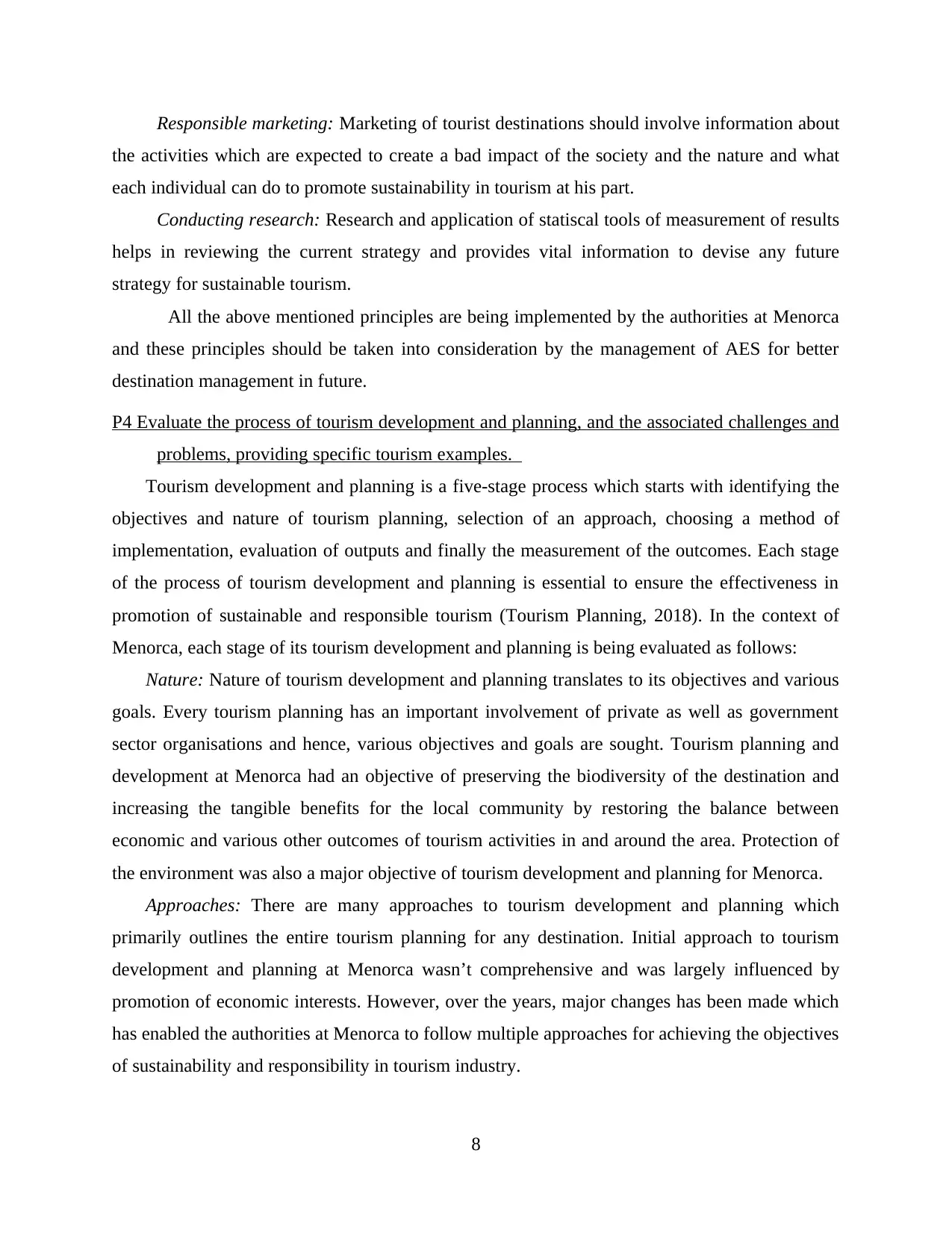
Responsible marketing: Marketing of tourist destinations should involve information about
the activities which are expected to create a bad impact of the society and the nature and what
each individual can do to promote sustainability in tourism at his part.
Conducting research: Research and application of statiscal tools of measurement of results
helps in reviewing the current strategy and provides vital information to devise any future
strategy for sustainable tourism.
All the above mentioned principles are being implemented by the authorities at Menorca
and these principles should be taken into consideration by the management of AES for better
destination management in future.
P4 Evaluate the process of tourism development and planning, and the associated challenges and
problems, providing specific tourism examples.
Tourism development and planning is a five-stage process which starts with identifying the
objectives and nature of tourism planning, selection of an approach, choosing a method of
implementation, evaluation of outputs and finally the measurement of the outcomes. Each stage
of the process of tourism development and planning is essential to ensure the effectiveness in
promotion of sustainable and responsible tourism (Tourism Planning, 2018). In the context of
Menorca, each stage of its tourism development and planning is being evaluated as follows:
Nature: Nature of tourism development and planning translates to its objectives and various
goals. Every tourism planning has an important involvement of private as well as government
sector organisations and hence, various objectives and goals are sought. Tourism planning and
development at Menorca had an objective of preserving the biodiversity of the destination and
increasing the tangible benefits for the local community by restoring the balance between
economic and various other outcomes of tourism activities in and around the area. Protection of
the environment was also a major objective of tourism development and planning for Menorca.
Approaches: There are many approaches to tourism development and planning which
primarily outlines the entire tourism planning for any destination. Initial approach to tourism
development and planning at Menorca wasn’t comprehensive and was largely influenced by
promotion of economic interests. However, over the years, major changes has been made which
has enabled the authorities at Menorca to follow multiple approaches for achieving the objectives
of sustainability and responsibility in tourism industry.
8
the activities which are expected to create a bad impact of the society and the nature and what
each individual can do to promote sustainability in tourism at his part.
Conducting research: Research and application of statiscal tools of measurement of results
helps in reviewing the current strategy and provides vital information to devise any future
strategy for sustainable tourism.
All the above mentioned principles are being implemented by the authorities at Menorca
and these principles should be taken into consideration by the management of AES for better
destination management in future.
P4 Evaluate the process of tourism development and planning, and the associated challenges and
problems, providing specific tourism examples.
Tourism development and planning is a five-stage process which starts with identifying the
objectives and nature of tourism planning, selection of an approach, choosing a method of
implementation, evaluation of outputs and finally the measurement of the outcomes. Each stage
of the process of tourism development and planning is essential to ensure the effectiveness in
promotion of sustainable and responsible tourism (Tourism Planning, 2018). In the context of
Menorca, each stage of its tourism development and planning is being evaluated as follows:
Nature: Nature of tourism development and planning translates to its objectives and various
goals. Every tourism planning has an important involvement of private as well as government
sector organisations and hence, various objectives and goals are sought. Tourism planning and
development at Menorca had an objective of preserving the biodiversity of the destination and
increasing the tangible benefits for the local community by restoring the balance between
economic and various other outcomes of tourism activities in and around the area. Protection of
the environment was also a major objective of tourism development and planning for Menorca.
Approaches: There are many approaches to tourism development and planning which
primarily outlines the entire tourism planning for any destination. Initial approach to tourism
development and planning at Menorca wasn’t comprehensive and was largely influenced by
promotion of economic interests. However, over the years, major changes has been made which
has enabled the authorities at Menorca to follow multiple approaches for achieving the objectives
of sustainability and responsibility in tourism industry.
8
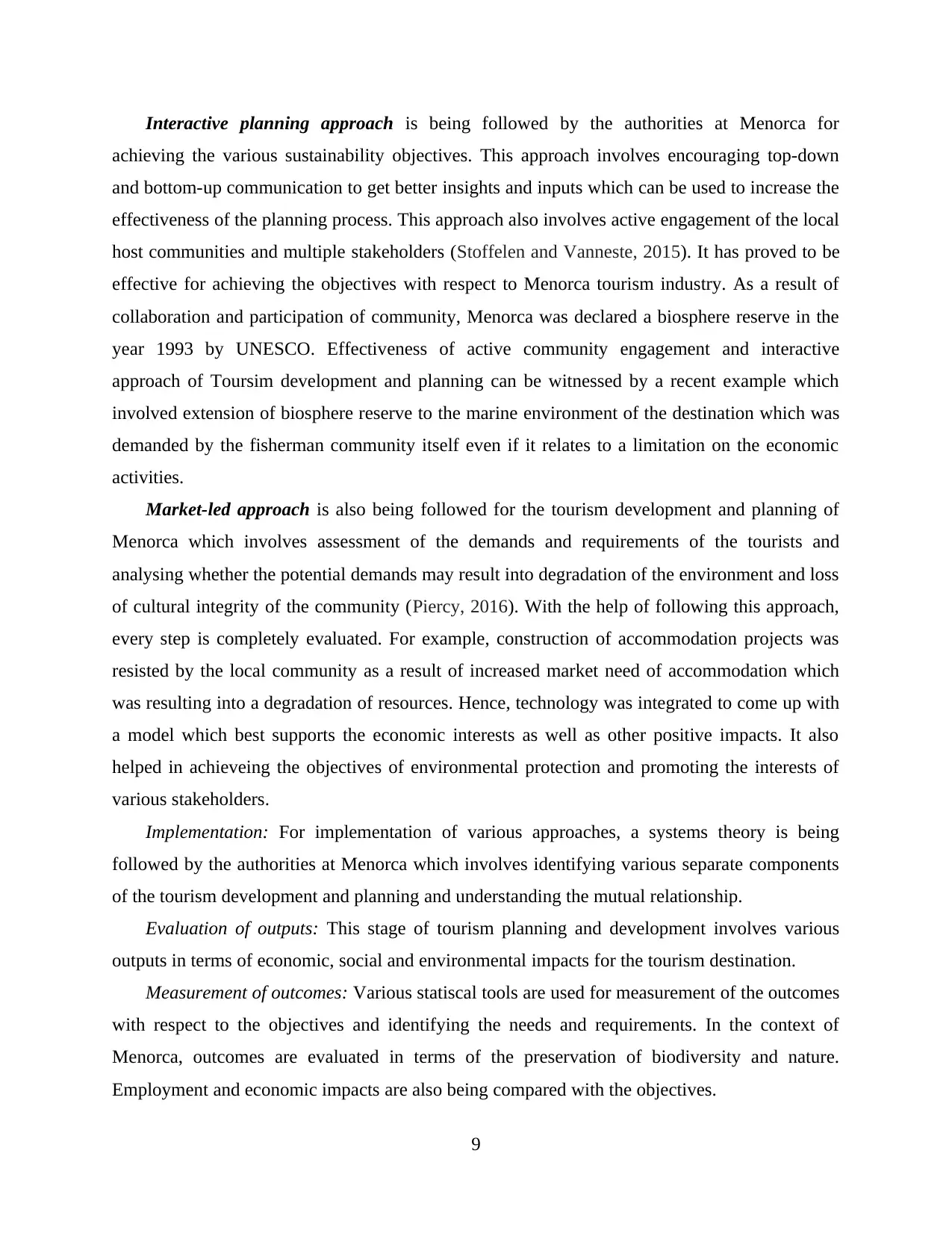
Interactive planning approach is being followed by the authorities at Menorca for
achieving the various sustainability objectives. This approach involves encouraging top-down
and bottom-up communication to get better insights and inputs which can be used to increase the
effectiveness of the planning process. This approach also involves active engagement of the local
host communities and multiple stakeholders (Stoffelen and Vanneste, 2015). It has proved to be
effective for achieving the objectives with respect to Menorca tourism industry. As a result of
collaboration and participation of community, Menorca was declared a biosphere reserve in the
year 1993 by UNESCO. Effectiveness of active community engagement and interactive
approach of Toursim development and planning can be witnessed by a recent example which
involved extension of biosphere reserve to the marine environment of the destination which was
demanded by the fisherman community itself even if it relates to a limitation on the economic
activities.
Market-led approach is also being followed for the tourism development and planning of
Menorca which involves assessment of the demands and requirements of the tourists and
analysing whether the potential demands may result into degradation of the environment and loss
of cultural integrity of the community (Piercy, 2016). With the help of following this approach,
every step is completely evaluated. For example, construction of accommodation projects was
resisted by the local community as a result of increased market need of accommodation which
was resulting into a degradation of resources. Hence, technology was integrated to come up with
a model which best supports the economic interests as well as other positive impacts. It also
helped in achieveing the objectives of environmental protection and promoting the interests of
various stakeholders.
Implementation: For implementation of various approaches, a systems theory is being
followed by the authorities at Menorca which involves identifying various separate components
of the tourism development and planning and understanding the mutual relationship.
Evaluation of outputs: This stage of tourism planning and development involves various
outputs in terms of economic, social and environmental impacts for the tourism destination.
Measurement of outcomes: Various statiscal tools are used for measurement of the outcomes
with respect to the objectives and identifying the needs and requirements. In the context of
Menorca, outcomes are evaluated in terms of the preservation of biodiversity and nature.
Employment and economic impacts are also being compared with the objectives.
9
achieving the various sustainability objectives. This approach involves encouraging top-down
and bottom-up communication to get better insights and inputs which can be used to increase the
effectiveness of the planning process. This approach also involves active engagement of the local
host communities and multiple stakeholders (Stoffelen and Vanneste, 2015). It has proved to be
effective for achieving the objectives with respect to Menorca tourism industry. As a result of
collaboration and participation of community, Menorca was declared a biosphere reserve in the
year 1993 by UNESCO. Effectiveness of active community engagement and interactive
approach of Toursim development and planning can be witnessed by a recent example which
involved extension of biosphere reserve to the marine environment of the destination which was
demanded by the fisherman community itself even if it relates to a limitation on the economic
activities.
Market-led approach is also being followed for the tourism development and planning of
Menorca which involves assessment of the demands and requirements of the tourists and
analysing whether the potential demands may result into degradation of the environment and loss
of cultural integrity of the community (Piercy, 2016). With the help of following this approach,
every step is completely evaluated. For example, construction of accommodation projects was
resisted by the local community as a result of increased market need of accommodation which
was resulting into a degradation of resources. Hence, technology was integrated to come up with
a model which best supports the economic interests as well as other positive impacts. It also
helped in achieveing the objectives of environmental protection and promoting the interests of
various stakeholders.
Implementation: For implementation of various approaches, a systems theory is being
followed by the authorities at Menorca which involves identifying various separate components
of the tourism development and planning and understanding the mutual relationship.
Evaluation of outputs: This stage of tourism planning and development involves various
outputs in terms of economic, social and environmental impacts for the tourism destination.
Measurement of outcomes: Various statiscal tools are used for measurement of the outcomes
with respect to the objectives and identifying the needs and requirements. In the context of
Menorca, outcomes are evaluated in terms of the preservation of biodiversity and nature.
Employment and economic impacts are also being compared with the objectives.
9
⊘ This is a preview!⊘
Do you want full access?
Subscribe today to unlock all pages.

Trusted by 1+ million students worldwide
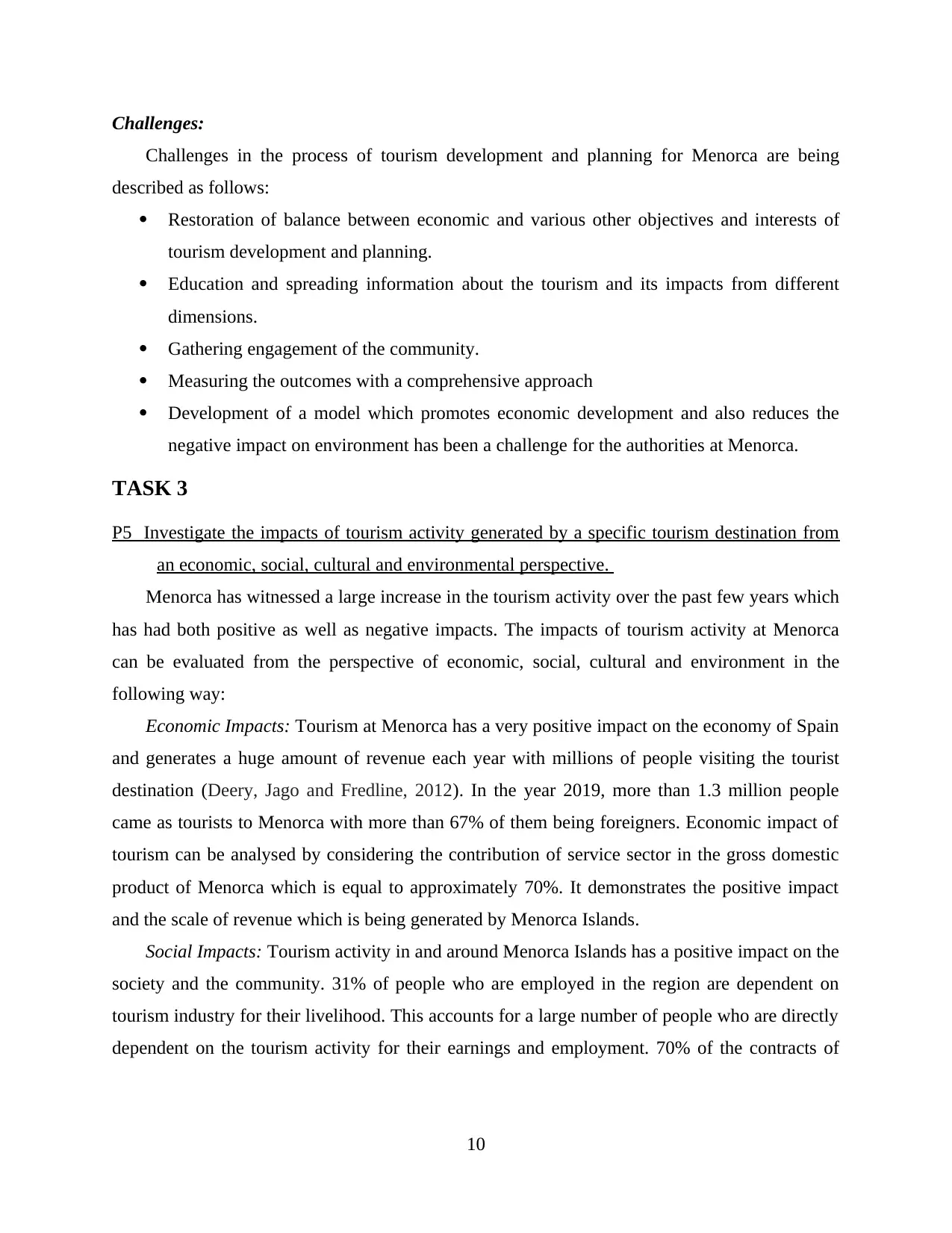
Challenges:
Challenges in the process of tourism development and planning for Menorca are being
described as follows:
Restoration of balance between economic and various other objectives and interests of
tourism development and planning.
Education and spreading information about the tourism and its impacts from different
dimensions.
Gathering engagement of the community.
Measuring the outcomes with a comprehensive approach
Development of a model which promotes economic development and also reduces the
negative impact on environment has been a challenge for the authorities at Menorca.
TASK 3
P5 Investigate the impacts of tourism activity generated by a specific tourism destination from
an economic, social, cultural and environmental perspective.
Menorca has witnessed a large increase in the tourism activity over the past few years which
has had both positive as well as negative impacts. The impacts of tourism activity at Menorca
can be evaluated from the perspective of economic, social, cultural and environment in the
following way:
Economic Impacts: Tourism at Menorca has a very positive impact on the economy of Spain
and generates a huge amount of revenue each year with millions of people visiting the tourist
destination (Deery, Jago and Fredline, 2012). In the year 2019, more than 1.3 million people
came as tourists to Menorca with more than 67% of them being foreigners. Economic impact of
tourism can be analysed by considering the contribution of service sector in the gross domestic
product of Menorca which is equal to approximately 70%. It demonstrates the positive impact
and the scale of revenue which is being generated by Menorca Islands.
Social Impacts: Tourism activity in and around Menorca Islands has a positive impact on the
society and the community. 31% of people who are employed in the region are dependent on
tourism industry for their livelihood. This accounts for a large number of people who are directly
dependent on the tourism activity for their earnings and employment. 70% of the contracts of
10
Challenges in the process of tourism development and planning for Menorca are being
described as follows:
Restoration of balance between economic and various other objectives and interests of
tourism development and planning.
Education and spreading information about the tourism and its impacts from different
dimensions.
Gathering engagement of the community.
Measuring the outcomes with a comprehensive approach
Development of a model which promotes economic development and also reduces the
negative impact on environment has been a challenge for the authorities at Menorca.
TASK 3
P5 Investigate the impacts of tourism activity generated by a specific tourism destination from
an economic, social, cultural and environmental perspective.
Menorca has witnessed a large increase in the tourism activity over the past few years which
has had both positive as well as negative impacts. The impacts of tourism activity at Menorca
can be evaluated from the perspective of economic, social, cultural and environment in the
following way:
Economic Impacts: Tourism at Menorca has a very positive impact on the economy of Spain
and generates a huge amount of revenue each year with millions of people visiting the tourist
destination (Deery, Jago and Fredline, 2012). In the year 2019, more than 1.3 million people
came as tourists to Menorca with more than 67% of them being foreigners. Economic impact of
tourism can be analysed by considering the contribution of service sector in the gross domestic
product of Menorca which is equal to approximately 70%. It demonstrates the positive impact
and the scale of revenue which is being generated by Menorca Islands.
Social Impacts: Tourism activity in and around Menorca Islands has a positive impact on the
society and the community. 31% of people who are employed in the region are dependent on
tourism industry for their livelihood. This accounts for a large number of people who are directly
dependent on the tourism activity for their earnings and employment. 70% of the contracts of
10
Paraphrase This Document
Need a fresh take? Get an instant paraphrase of this document with our AI Paraphraser
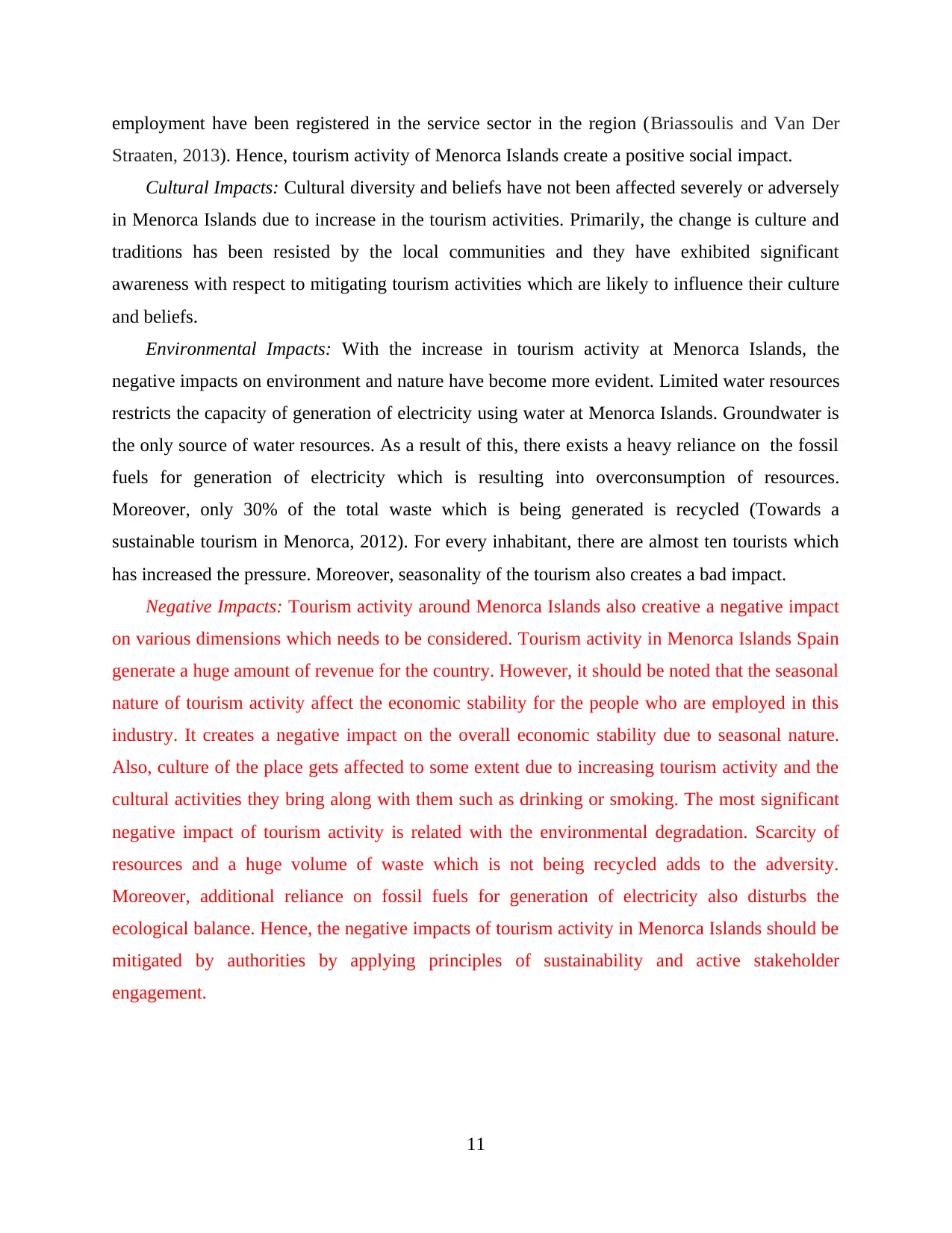
employment have been registered in the service sector in the region (Briassoulis and Van Der
Straaten, 2013). Hence, tourism activity of Menorca Islands create a positive social impact.
Cultural Impacts: Cultural diversity and beliefs have not been affected severely or adversely
in Menorca Islands due to increase in the tourism activities. Primarily, the change is culture and
traditions has been resisted by the local communities and they have exhibited significant
awareness with respect to mitigating tourism activities which are likely to influence their culture
and beliefs.
Environmental Impacts: With the increase in tourism activity at Menorca Islands, the
negative impacts on environment and nature have become more evident. Limited water resources
restricts the capacity of generation of electricity using water at Menorca Islands. Groundwater is
the only source of water resources. As a result of this, there exists a heavy reliance on the fossil
fuels for generation of electricity which is resulting into overconsumption of resources.
Moreover, only 30% of the total waste which is being generated is recycled (Towards a
sustainable tourism in Menorca, 2012). For every inhabitant, there are almost ten tourists which
has increased the pressure. Moreover, seasonality of the tourism also creates a bad impact.
Negative Impacts: Tourism activity around Menorca Islands also creative a negative impact
on various dimensions which needs to be considered. Tourism activity in Menorca Islands Spain
generate a huge amount of revenue for the country. However, it should be noted that the seasonal
nature of tourism activity affect the economic stability for the people who are employed in this
industry. It creates a negative impact on the overall economic stability due to seasonal nature.
Also, culture of the place gets affected to some extent due to increasing tourism activity and the
cultural activities they bring along with them such as drinking or smoking. The most significant
negative impact of tourism activity is related with the environmental degradation. Scarcity of
resources and a huge volume of waste which is not being recycled adds to the adversity.
Moreover, additional reliance on fossil fuels for generation of electricity also disturbs the
ecological balance. Hence, the negative impacts of tourism activity in Menorca Islands should be
mitigated by authorities by applying principles of sustainability and active stakeholder
engagement.
11
Straaten, 2013). Hence, tourism activity of Menorca Islands create a positive social impact.
Cultural Impacts: Cultural diversity and beliefs have not been affected severely or adversely
in Menorca Islands due to increase in the tourism activities. Primarily, the change is culture and
traditions has been resisted by the local communities and they have exhibited significant
awareness with respect to mitigating tourism activities which are likely to influence their culture
and beliefs.
Environmental Impacts: With the increase in tourism activity at Menorca Islands, the
negative impacts on environment and nature have become more evident. Limited water resources
restricts the capacity of generation of electricity using water at Menorca Islands. Groundwater is
the only source of water resources. As a result of this, there exists a heavy reliance on the fossil
fuels for generation of electricity which is resulting into overconsumption of resources.
Moreover, only 30% of the total waste which is being generated is recycled (Towards a
sustainable tourism in Menorca, 2012). For every inhabitant, there are almost ten tourists which
has increased the pressure. Moreover, seasonality of the tourism also creates a bad impact.
Negative Impacts: Tourism activity around Menorca Islands also creative a negative impact
on various dimensions which needs to be considered. Tourism activity in Menorca Islands Spain
generate a huge amount of revenue for the country. However, it should be noted that the seasonal
nature of tourism activity affect the economic stability for the people who are employed in this
industry. It creates a negative impact on the overall economic stability due to seasonal nature.
Also, culture of the place gets affected to some extent due to increasing tourism activity and the
cultural activities they bring along with them such as drinking or smoking. The most significant
negative impact of tourism activity is related with the environmental degradation. Scarcity of
resources and a huge volume of waste which is not being recycled adds to the adversity.
Moreover, additional reliance on fossil fuels for generation of electricity also disturbs the
ecological balance. Hence, the negative impacts of tourism activity in Menorca Islands should be
mitigated by authorities by applying principles of sustainability and active stakeholder
engagement.
11
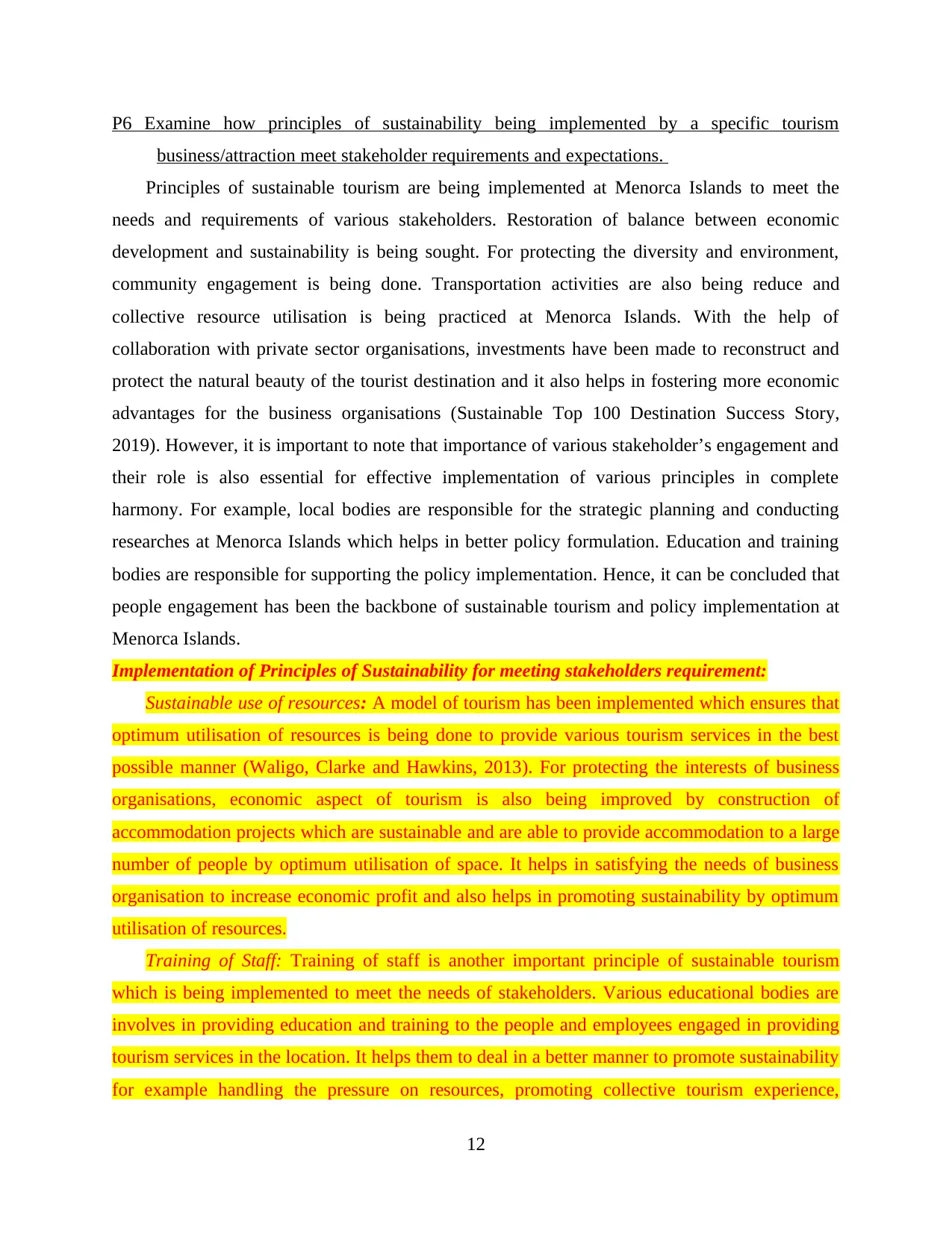
P6 Examine how principles of sustainability being implemented by a specific tourism
business/attraction meet stakeholder requirements and expectations.
Principles of sustainable tourism are being implemented at Menorca Islands to meet the
needs and requirements of various stakeholders. Restoration of balance between economic
development and sustainability is being sought. For protecting the diversity and environment,
community engagement is being done. Transportation activities are also being reduce and
collective resource utilisation is being practiced at Menorca Islands. With the help of
collaboration with private sector organisations, investments have been made to reconstruct and
protect the natural beauty of the tourist destination and it also helps in fostering more economic
advantages for the business organisations (Sustainable Top 100 Destination Success Story,
2019). However, it is important to note that importance of various stakeholder’s engagement and
their role is also essential for effective implementation of various principles in complete
harmony. For example, local bodies are responsible for the strategic planning and conducting
researches at Menorca Islands which helps in better policy formulation. Education and training
bodies are responsible for supporting the policy implementation. Hence, it can be concluded that
people engagement has been the backbone of sustainable tourism and policy implementation at
Menorca Islands.
Implementation of Principles of Sustainability for meeting stakeholders requirement:
Sustainable use of resources: A model of tourism has been implemented which ensures that
optimum utilisation of resources is being done to provide various tourism services in the best
possible manner (Waligo, Clarke and Hawkins, 2013). For protecting the interests of business
organisations, economic aspect of tourism is also being improved by construction of
accommodation projects which are sustainable and are able to provide accommodation to a large
number of people by optimum utilisation of space. It helps in satisfying the needs of business
organisation to increase economic profit and also helps in promoting sustainability by optimum
utilisation of resources.
Training of Staff: Training of staff is another important principle of sustainable tourism
which is being implemented to meet the needs of stakeholders. Various educational bodies are
involves in providing education and training to the people and employees engaged in providing
tourism services in the location. It helps them to deal in a better manner to promote sustainability
for example handling the pressure on resources, promoting collective tourism experience,
12
business/attraction meet stakeholder requirements and expectations.
Principles of sustainable tourism are being implemented at Menorca Islands to meet the
needs and requirements of various stakeholders. Restoration of balance between economic
development and sustainability is being sought. For protecting the diversity and environment,
community engagement is being done. Transportation activities are also being reduce and
collective resource utilisation is being practiced at Menorca Islands. With the help of
collaboration with private sector organisations, investments have been made to reconstruct and
protect the natural beauty of the tourist destination and it also helps in fostering more economic
advantages for the business organisations (Sustainable Top 100 Destination Success Story,
2019). However, it is important to note that importance of various stakeholder’s engagement and
their role is also essential for effective implementation of various principles in complete
harmony. For example, local bodies are responsible for the strategic planning and conducting
researches at Menorca Islands which helps in better policy formulation. Education and training
bodies are responsible for supporting the policy implementation. Hence, it can be concluded that
people engagement has been the backbone of sustainable tourism and policy implementation at
Menorca Islands.
Implementation of Principles of Sustainability for meeting stakeholders requirement:
Sustainable use of resources: A model of tourism has been implemented which ensures that
optimum utilisation of resources is being done to provide various tourism services in the best
possible manner (Waligo, Clarke and Hawkins, 2013). For protecting the interests of business
organisations, economic aspect of tourism is also being improved by construction of
accommodation projects which are sustainable and are able to provide accommodation to a large
number of people by optimum utilisation of space. It helps in satisfying the needs of business
organisation to increase economic profit and also helps in promoting sustainability by optimum
utilisation of resources.
Training of Staff: Training of staff is another important principle of sustainable tourism
which is being implemented to meet the needs of stakeholders. Various educational bodies are
involves in providing education and training to the people and employees engaged in providing
tourism services in the location. It helps them to deal in a better manner to promote sustainability
for example handling the pressure on resources, promoting collective tourism experience,
12
⊘ This is a preview!⊘
Do you want full access?
Subscribe today to unlock all pages.

Trusted by 1+ million students worldwide
1 out of 16
Related Documents
Your All-in-One AI-Powered Toolkit for Academic Success.
+13062052269
info@desklib.com
Available 24*7 on WhatsApp / Email
![[object Object]](/_next/static/media/star-bottom.7253800d.svg)
Unlock your academic potential
Copyright © 2020–2026 A2Z Services. All Rights Reserved. Developed and managed by ZUCOL.



![Sustainable and Responsible Tourism Management Report - [Course Name]](/_next/image/?url=https%3A%2F%2Fdesklib.com%2Fmedia%2Fimages%2Ftt%2F97543c1e789843e897460d59424ee454.jpg&w=256&q=75)

